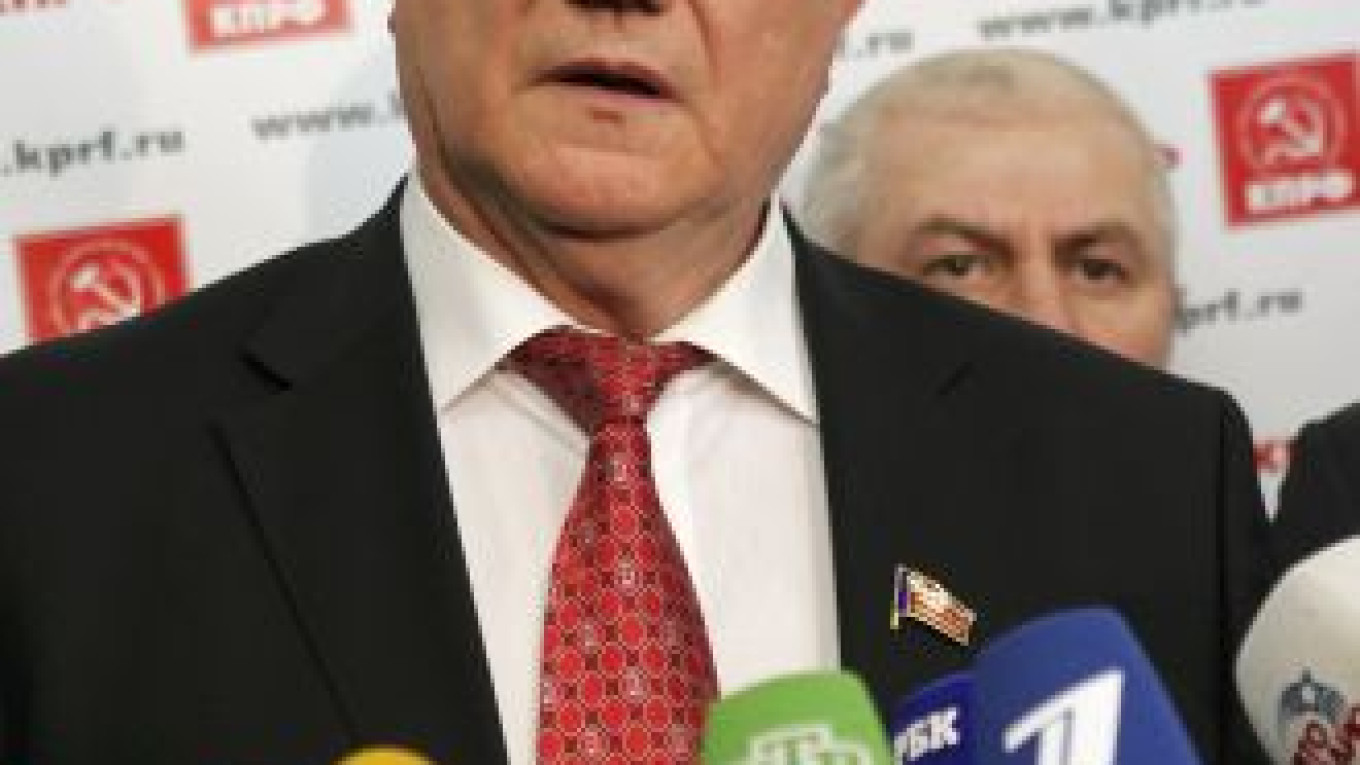When Communist Party leader Gennady Zyuganov arrived at his campaign headquarters in downtown Moscow following Sunday's presidential election, he appeared more stressed than usual after the grueling months of a hard political battle that ended with a predictable result.
For the fourth time Zyuganov came in second place, but this time his future — along with that of other presidential also-rans Vladimir Zhirinovsky and Sergei Mironov — is in doubt, raising questions about whether the 2012 election marked the veteran's final act on the political stage.
While Zyuganov vowed to continue bringing his people out to protest against President-elect Vladimir Putin, several observers say the longtime Communist Party boss faces numerous challenges to stay relevant in a fast-changing political landscape.
For starters, at the age of 68, Zyuganov faces pressure to bow out to a younger successor. But the emerging new leaders of the opposition movement may be Zyuganov's biggest threat, as growing discontent casts light on his cozy relationship with the Kremlin over the years.
"Many people who continue to vote for Zyuganov don't even know that he has long had a close partnership with Putin," a senior Yeltsin-era government official told The Moscow Times, speaking on condition of anonymity.
But the strength of that relationship has been cast in doubt as Zyuganov publicly attacked Sunday's election results as "illegitimate" and declined to attend a meeting with Putin with the other defeated candidates the following day.
"By questioning the legitimacy of the election, he risks losing his authority within the existing political system," said Iosif Diskin, a political expert and member of the Public Chamber.
As his status as a reliable Kremlin partner fades, Zyuganov also faces pressure from other groups who see him as too old and compromised to relate to the agenda of the younger, protest-minded leaders.
The very existence of the party might also be in danger as its older bedrock supporters die off and new parties emerge due to political liberalization promised by outgoing President Dmitry Medvedev.
"For a party whose hardcore electorate is dying out, it would be hard to survive in an environment with more political variety. It will require huge rebranding or they will face death," said Alexei Mukhin of the Center for Political Information.
Zyuganov's age is another problem. He will be 74 by the time the next presidential election rolls around, which is likely too old for a president of modern Russia. The same can be said about nationalist Zhirinovsky, a five-time loser in presidential elections for the Liberal Democrats, who will be 72 in 2018.
Zhirinovsky's uglier-than-usual performances during televised debates in which he set off on angry tirades put off many, and he came in a distant fourth on Sunday with just 6 percent of the vote.
"The situation on the street shows that people are tired of the old faces and hope that new ones will emerge," said Olga Mefodyeva of the Center for Political Technologies.
Like Zhirinovsky, Just Russia head Mironov can also be expected to face pressure from far more charismatic leaders in his own party, following his last-place showing in the election.
"He has shown himself to be a toothless politician during the campaign," Mefodyeva said.
Perhaps the only candidate with a likely future is billionaire Mikhail Prokhorov, a newcomer to the scene, who has already said he plans to build upon his 8 percent to create a new political party. But he would also face enormous challenges, Diskin said.
"Prokhorov plays the same role for liberals as Zhirinovsky for nationalists. Then the real competition will emerge, and his rivals will remind people of everything," he said.
A Message from The Moscow Times:
Dear readers,
We are facing unprecedented challenges. Russia's Prosecutor General's Office has designated The Moscow Times as an "undesirable" organization, criminalizing our work and putting our staff at risk of prosecution. This follows our earlier unjust labeling as a "foreign agent."
These actions are direct attempts to silence independent journalism in Russia. The authorities claim our work "discredits the decisions of the Russian leadership." We see things differently: we strive to provide accurate, unbiased reporting on Russia.
We, the journalists of The Moscow Times, refuse to be silenced. But to continue our work, we need your help.
Your support, no matter how small, makes a world of difference. If you can, please support us monthly starting from just $2. It's quick to set up, and every contribution makes a significant impact.
By supporting The Moscow Times, you're defending open, independent journalism in the face of repression. Thank you for standing with us.
Remind me later.


